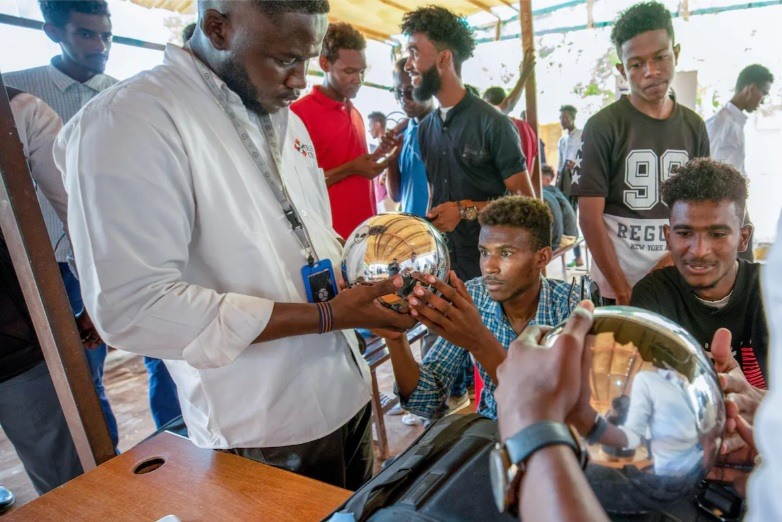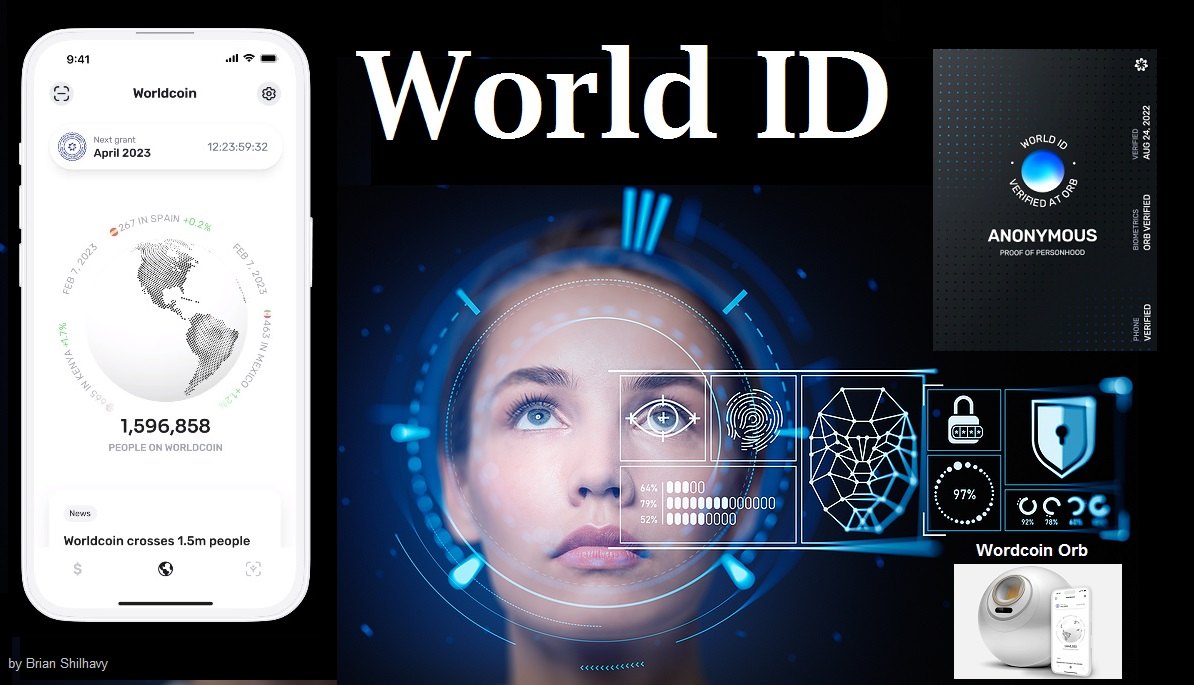Kenya Bans Worldcoin and World ID as Other Nations Push Back on Privacy Concerns

Scanning eyes to create a World ID. Image source.
Comments by Brian Shilhavy
Editor, Health Impact News
It’s good to see countries push back against Sam Altman’s Worldcoin and World ID universal basic income plans due to privacy concerns.
But don’t wait for governments to save you from Big Tech’s plans to catalog the biometrics of the world’s population. Do NOT let anyone scan your body parts or take DNA samples in return for “freebies” and false promises.
For our original coverage of Worldcoin and World ID, see:
Get Ready for World ID and WorldCoin Universal Basic Income Offering Free Money in Exchange for Your Eyeball Scan

Kenya bans Worldcoin activities as citizens trade biometrics for tokens
by Joel R. McConveyBiometricUpdate.com
Worldcoin, which says it wants to build a “more human internet” with its World ID credential and globular iris scanning device, has been told that the its plan is not welcome in Kenya until its biometric data collection practices have passed a legal assessment, according to Africa News.
The country’s Ministry of Home Affairs announced it is suspending Worldcoin’s enrollments and cryptocurrency issuance while “the relevant government agencies certify the absence of any risk to the public.”
Worldcoin, which was founded by OpenAI’s Sam Altman, is doling out free crypto to anyone who undergoes an iris scan by staring into the eye of the Orb, its somewhat dystopian looking biometric capture and imaging device. In Kenya, tokens are worth approximately 7700 shillings, or around US$54 – no small amount when the national gross income per capita is around US$2,170. The offer has worked, with thousands of people showing out in the capital of Nairobi this week to trade their iris scans for crypto and a digital ID.
But concerns about Worldcoin’s commitment to privacy and the legality of its practices mean that, for now, anyone left holding a Worldcoin token will have to wait to cash it. Although the company’s parent, Tools for Humanity GmbH, is registered with the data commissioner as a data processor, and can legally collect private data from residents, privacy experts say there is no guarantee that it will do what it says with whatever data it collects. As well, there have been questions about the biometric security of the Orb, after malware was found on operators’ personal devices.
Despite such concerns, Worldcoin is forging ahead with its plan for global domination, aiming to deploy 1,500 Orbs around the world. As reported by Reuters, the company wants to build a massive financial and identity community that can be of use to organizations, businesses, and governments. Regional manager for Europe, Ricardo Macieira, says the infrastructure could provide a framework for universal basic income and “global democratic processes.” Or, on a smaller scale, cafes wanting to give away freebies while deterring people from taking multiples could scan their customers’ irises to make sure they take one coffee, and no more.
“The idea is that anyone can in the future build their own orb and use it to benefit the community that it’s aiming for,” says Macieira, who confirmed that Worldcoin intends to continue expanding operations in Europe, Latin America and Africa, as well as “all the parts of the world that will accept us.”
Kenya joins regulators in the UK, France, Germany, and Mexico who have all launched investigations into the legality and ethics of Worldcoin’s biometric capture and storage practices.
Read the full article at BiometricUpdate.com.
Multiple regulators turn gaze to Worldcoin’s iris collection
by Masha BorakBiometricUpdate.com
Regulators in the UK, France, Germany, Kenya and Mexico are scrutinizing Worldcoin, the company that offers people free cryptocurrency for enrolling in its digital ID by scanning their irises.
After the UK Information Commissioner’s Office promised last week it will be making further inquiries into Woldcoin’s launch in the country, the Bavarian State Office for Data Protection Supervision announced that it has been investigating Worldcoin for nearly a year over its large-scale processing of sensitive biometric data.
The investigation was opened last November, Reuters reports.
The German agency keeps an eye on Worldcoin under European Union data protection rules because Tools For Humanity, which develops technology for Worldcoin, has German headquarters.
France’s privacy watchdog CNIL also took an interest in Worldcoin, which launched its crypto token last week. The government agency told Reuters Friday that the legality of collecting iris biometric data and the conditions of its storing “seems questionable.” It has since, however, handed over the case to Bavarian authorities.
European regulators are not the only ones scrutinizing the company, which was founded by OpenAI CEO Sam Altman.
Kenya’s data watchdog has urged the public to be extra vigilant when interacting with Worldcoin, highlighting concerns about the processing of sensitive personal data and compliance with the country’s Data Protection Act of 2019. The Office of the Data Protection Commissioner (ODPC) is conducting its assessment, Innovation Village reported.
In Mexico, privacy advocates have been warning that the country’s weak data protection laws mean that citizens could be left unprotected in case of data breaches or abuses. Mexico’s data agency INAI is unable to carry out its functions because it lacks one of its commissioners. Mexico President Andrés Manuel López Obrador is trying to scrap the data protection body as part of a wider overhaul of the country’s regulators and watchdogs, Reuters reported.
Users in Mexico could also be left unprotected because Worldcoin is headquartered in Germany and the United States, says Agneris Sampieri, Latin America policy analyst at digital rights group Access Now.
Worldcoin enrolls users into its World ID digital identity service by scanning their irises with its Orb devices. The iris scan is meant to confirm that the user is indeed human while remaining anonymized. The company says its World ID, which has been issued to more than 2 million people, is not linked to the name, address or personal data of users.
It also claims that the project abides by Europe’s General Data Protection Regulation (GDPR) and that the images of the user and their iris pattern are permanently deleted after signing up unless users agree to allow them to be stored. The training data is not connected to Worldcoin tokens, transactions or World ID, according to the company.
Worldcoin’s data practices are also raising questions about the corporate structure of the project’s developer, Tools for Humanity, and which part of the company handles liability.
In a reply to TechCrunch, a Tools for Humanity spokesperson reportedly said that the data controller now is the Worldcoin Foundation, with Tools For Humanity being a data processor for Worldcoin.
While Tools for Humanity is a for-profit tech company, Worldcoin could not provide a clear answer on whether it is a for-profit or not-for-profit entity because its decentralized governance complicates its structure.
Among other entities in the project are the Worldcoin Foundation and Worldcoin Protocol.
Read the full article at BiometricUpdate.com.
THANKS TO: https://medicalkidnap.com/2023/08/02/kenya-bans-worldcoin-and-world-id-as-other-nations-push-back-on-privacy-concerns/






 Sat Mar 23, 2024 11:33 pm by globalturbo
Sat Mar 23, 2024 11:33 pm by globalturbo

